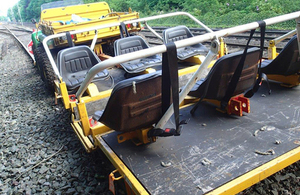Report 03/2018: Trailer runaway near Hope, Derbyshire
RAIB has today released its report into a trailer runaway near Hope, Derbyshire, on 28 May 2017

Image of gator and trailer
Summary
At around 06:30 hrs on Sunday 28 May 2017, a trailer, being propelled by a small rail tractor between Edale and Bamford, became detached and ran away for a distance of around 1 mile (1.6 km). It came to a stop at a set of points at Earles Sidings, near Hope. There were no injuries that required medical attention, and there was no significant damage to the infrastructure, the trailer or the tractor.
The tractor and trailer became separated because the towbar pin fell out. A linch pin that secured the towbar pin had almost certainly been inserted in the wrong orientation. This would have resulted in it falling out, allowing the towbar pin to fall out and the towbar to become uncoupled.
The subsequent runaway occurred because the brakes on the trailer had been manually disabled by the staff present, to overcome them being stuck in the applied position. It is likely that this was because the hydraulic brake hose between the tractor and the trailer had either been not connected or incorrectly connected at the start of the shift.
Recommendations
The RAIB has made three recommendations to Network Rail as a result of this investigation. One relates to providing staff with guidance on what actions to take if a trailer becomes immobilised when being used. The second relates to management of staff competence at the depot involved in the incident. The third relates to learning lessons from multiple non-compliances during use of the plant.
The RAIB has also identified two learning points, relating to the precautions required when isolating trailer brakes and to the requirements to carry out a full set of brake tests prior to use.
Simon French, Chief Inspector of Rail Accidents said:
In 2004, four men died when they were hit by a runaway trolley on the west coast main line near Tebay. The brakes on that trolley had been deliberately disabled, and two of the people responsible were subsequently convicted of manslaughter and sent to gaol. It’s therefore very worrying for RAIB when we hear of runaway trolleys and other items of plant, because we know just how silent and deadly they can be.
On the Hope Valley line on 28 May 2017, the runaway trailer did not hit anything and there were no serious consequences. However, one of the factors which caused the incident was that the trailer’s brakes had been disabled. This may have been done with the best of intentions, to keep the job running, but if the potential consequences had been considered, it should never have been contemplated. Just testing the set-up properly before starting to use the tractor unit and its trailer would have shown what was wrong. The whole episode, as our report shows, was a saga arising from lack of training, care, and caution.
I hope that everyone who works with on-track plant and machinery will take note of the lessons from this report, and never again be tempted to cut corners while using equipment on the line.
Notes to editors
- The sole purpose of RAIB investigations is to prevent future accidents and incidents and improve railway safety. RAIB does not establish blame, liability or carry out prosecutions.
- RAIB operates, as far as possible, in an open and transparent manner. While our investigations are completely independent of the railway industry, we do maintain close liaison with railway companies and if we discover matters that may affect the safety of the railway, we make sure that information about them is circulated to the right people as soon as possible, and certainly long before publication of our final report.
- For media enquiries, please call 01932 440015.